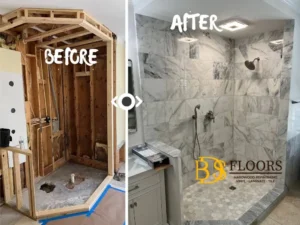Vinyl Flooring Installation Labor Cost: Is It Worth the Investment?
Looking to upgrade your flooring but unsure if vinyl is worth the investment? Vinyl flooring has come a long way in recent years, offering an affordable and versatile option for homeowners. In this article, we will explore the labor costs associated with vinyl flooring installation and determine if it’s worth your hard-earned money.
Vinyl flooring is known for being durable and resistant to moisture, making it an excellent choice for areas like kitchens and bathrooms. The installation process can vary depending on the type of vinyl flooring you choose, ranging from peel-and-stick options to full glue-down installations. While vinyl flooring can be more affordable than other types of flooring, the labor costs involved can impact your budget.
By understanding the labor costs associated with vinyl flooring installation, you can make an informed decision that aligns with your needs and budget. We’ll break down the factors that influence labor costs and provide insights into whether the investment is worth it for you.
Let’s dive in and explore the world of vinyl flooring installation labor costs!

Factors that affect vinyl flooring installation labor cost
When it comes to vinyl flooring installation, several factors can influence the labor cost. Understanding these factors will help you determine if vinyl flooring installation is worth the investment for your specific project.
1. Type of Vinyl Flooring: The type of vinyl flooring you choose will impact the labor cost. Peel-and-stick vinyl flooring is generally easier to install and requires less time and expertise compared to glue-down or click-lock options. The complexity of the installation process will affect the labor cost.
2. Subfloor Preparation: The condition of your subfloor will also affect the labor cost. If your subfloor requires extensive preparation, such as leveling or removing old flooring, it will add to the overall labor cost. Ensuring a smooth and even subfloor is essential for a successful vinyl flooring installation.
3. Room Size and Layout: The size and layout of the room will influence the labor cost. Larger rooms or rooms with intricate layouts may require more time and effort for installation. The more complex the room, the higher the labor cost.
4. Additional Services: Additional services, such as removing and disposing of old flooring, can increase the labor cost. If you require additional services beyond the installation itself, it’s important to factor in those costs when considering the overall investment.
5. Location: Labor costs can vary depending on your geographical location. Urban areas may have higher labor rates compared to rural areas. It’s essential to research and compare labor costs in your specific location to get an accurate estimate.
Now that we’ve explored the factors that influence labor costs, let’s take a closer look at the average vinyl flooring installation labor cost.

Average vinyl flooring installation labor cost
The average labor cost for vinyl flooring installation can vary depending on the factors mentioned earlier. On average, homeowners can expect to pay between $2 and $5 per square foot for vinyl flooring installation. This cost typically includes the removal of old flooring, subfloor preparation, and the installation of the new vinyl flooring.
It’s important to note that this average cost is a general guideline, and the actual labor cost for your project may be higher or lower based on your specific circumstances. Obtaining multiple quotes from different installers will help you determine the most accurate labor cost for your vinyl flooring installation.
While vinyl flooring installation labor costs can add up, there are several benefits to hiring a professional for the job.
Benefits of hiring a professional for vinyl flooring installation
- Expertise and Experience: Professional installers have the necessary expertise and experience to ensure a successful vinyl flooring installation. They are familiar with the intricacies of the Vinyl Flooring Installation Labor Cost installation process and can handle any challenges that may arise.
- Time and Efficiency: Hiring a professional installer can save you time and effort. They have the necessary tools and equipment to complete the Vinyl Flooring Installation Labor Cost installation efficiently, allowing you to enjoy your new flooring sooner.
- Warranty and Guarantee: Many professional installers offer warranties or guarantees on their Vinyl Flooring Installation Labor Cost work. This provides peace of mind knowing that if any issues arise after the installation, the installer will rectify them at no additional cost.
While hiring a professional installer comes with its benefits, some homeowners may consider the option of DIY installation to save on Vinyl Flooring Installation Labor Cost.

DIY vs. hiring a professional for vinyl flooring installation
DIY installation can be a tempting option for homeowners looking to cut costs. However, it’s essential to weigh the pros and cons before deciding to tackle the installation yourself.
1. Cost Savings: DIY installation can save you money on labor costs. However, it’s important to consider your level of experience and expertise. Improper installation can lead to costly repairs or even the need to replace the flooring entirely.
2. Time and Effort: Installing vinyl flooring can be time-consuming and physically demanding, especially if you have little experience with this type of project. It’s important to assess whether you have the time and energy to dedicate to the installation.
3. Quality and Aesthetics: Professional installers have the skills and knowledge to ensure a high-quality installation. They can create seamless transitions and ensure the flooring looks aesthetically pleasing. DIY installations may not achieve the same level of quality.
Now that we’ve explored the benefits and considerations of hiring a professional installer versus DIY installation, let’s delve into the steps involved in vinyl flooring installation.
Steps involved in vinyl flooring installation
he installation process for vinyl flooring varies depending on the type and manufacturer’s instructions. Here’s a general overview, including considerations for Vinyl Flooring Installation Labor Cost:
- Prepare the Subfloor: Ensure it’s clean, dry, and level, while also considering Vinyl Flooring Installation Labor Cost.
- Acclimate the Flooring: Allow it to adjust to room conditions, factoring in Vinyl Flooring Installation Labor Cost.
- Measure and Cut: Fit the vinyl with a small gap for expansion, taking into account Vinyl Flooring Installation Labor Cost.
- Apply Adhesive (if necessary): Follow the manufacturer’s instructions and consider Vinyl Flooring Installation Labor Cost.
- Install the Vinyl: Start from one corner, ensuring a smooth finish, with an eye on Vinyl Flooring Installation Labor Cost.
- Trim and Finish: Complete the job with baseboards or transitions, while also considering Vinyl Flooring Installation Labor Cost.
For specific guidance, consult the manufacturer’s instructions. Now, let’s explore tips for finding an affordable vinyl flooring installer, considering Vinyl Flooring Installation Labor Cost.
Tips for finding a reliable and affordable vinyl flooring installer
Finding a reliable and affordable vinyl flooring installer is crucial to ensure a successful installation. Here are some tips to help you find the right professional for the job:
1. Research and Compare: Take the time to research and compare different installers in your area. Look for reviews and ratings from previous customers to get an idea of their reputation and work quality.
2. Ask for Recommendations: Reach out to friends, family, or neighbors who have recently had vinyl flooring installed. Ask for their recommendations and any insights they can provide.
3. Request Quotes: Obtain quotes from multiple installers. Ensure the quotes include the labor cost, any additional services, and the estimated timeline for the project. This will help you compare prices and make an informed decision.
4. Check Credentials: Verify that the installer is licensed, insured, and certified. This ensures they have the necessary qualifications and protects you in case of any accidents or damages during the installation.
By following these tips, you can find a reliable and affordable vinyl flooring installer who will deliver high-quality work.
Now that we’ve covered the steps involved in vinyl flooring installation and how to find the right installer, let’s consider some additional factors before investing in vinyl flooring installation labor.
Considerations before investing in vinyl flooring installation labor
Before committing to vinyl flooring installation, there are a few additional factors to consider:
1. Lifestyle and Usage: Consider your lifestyle and how the flooring will be used. Vinyl flooring is durable and resistant to moisture, making it ideal for high-traffic areas. However, if you have pets or young children, you may want to choose a more scratch-resistant option.
2. Long-Term Investment: Vinyl flooring can last for many years with proper care. Consider the long-term investment and whether vinyl flooring aligns with your aesthetic preferences and future plans for your home.
3. Maintenance and Care: Vinyl flooring is relatively low-maintenance, requiring regular cleaning and occasional maintenance. Consider the upkeep required and whether it fits into your lifestyle and maintenance routine.
By considering these factors, you can make an informed decision about whether vinyl flooring installation is worth the investment for your home.
Comparing the cost of vinyl flooring installation to other flooring options
To determine if vinyl flooring installation is worth the investment, it’s helpful to compare the cost to other flooring options. Here’s a brief comparison:
1. Hardwood Flooring: Hardwood flooring is a popular and timeless option but can be more expensive to install compared to vinyl. However, hardwood flooring adds significant value to your home and has a longer lifespan.
2. Laminate Flooring: Laminate flooring is a more affordable alternative to hardwood and vinyl flooring. While it mimics the look of hardwood, it may not offer the same durability and moisture resistance as vinyl.
3. Carpeting: Carpeting can be a budget-friendly option, but it may not be as durable or easy to clean as vinyl flooring. It’s important to consider your specific needs and preferences when comparing carpeting to vinyl.
By comparing the cost and benefits of different flooring options, you can make an informed decision that aligns with your budget and lifestyle.
Conclusion: Is vinyl flooring installation labor worth the investment?
In conclusion, vinyl flooring installation, with careful consideration of Vinyl Flooring Installation Labor Cost, can be a worthwhile investment for homeowners seeking an affordable and versatile flooring option. Labor costs may vary, but hiring professionals ensures quality.
Consider budget, lifestyle, and long-term plans when evaluating the cost of Vinyl Flooring Installation Labor. Compare these expenses to make an informed choice.
Research and compare installers, get multiple quotes, and check credentials for reliability in managing Vinyl Flooring Installation Labor Cost. Vinyl flooring offers durability, moisture resistance, and aesthetics.
Invest wisely in vinyl flooring installation for a transformed and lasting home, factoring in Vinyl Flooring Installation Labor Cost. Don’t overlook its benefits when upgrading your flooring with the consideration of Vinyl Flooring Installation Labor Cost.








